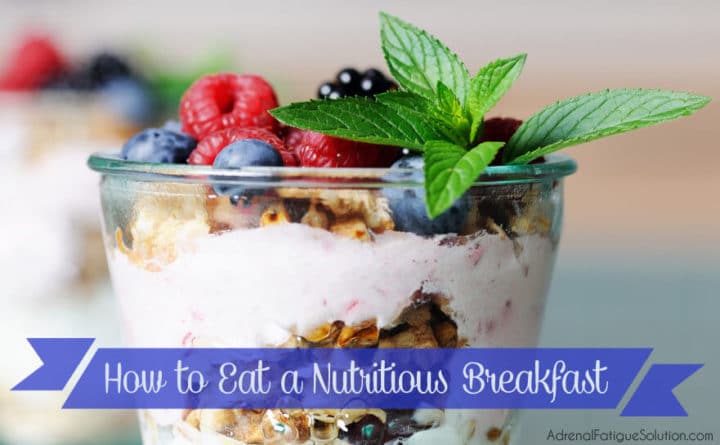We have all been told that breakfast is the most important meal of the day. However, with statistics revealing that between 10% and 30% of adult Americans don’t eat any breakfast in the morning, we have to ask if this is true. Many people survive without any breakfast at all, so is it really as important as we thought?
As you might have guessed, the answer is emphatically YES. In 2008, the Pediatrics Journal published a study on the importance of breakfast, including an experiment in which a group of students were given a written test after they had eaten breakfast, and then the next day given a similar test after they had not eaten breakfast. Unsurprisingly, students performed best on the day they had eaten breakfast before completing the test. In the same study it was revealed that those who regularly eat breakfast have lower levels of cholesterol, lower levels of body fat, and have improved brain capacity.
Try To Include Low-GI Foods
However, it is not simply the act of eating breakfast that is important; the type of breakfast also makes a big difference. The British Journal of Nutrition found that breakfasts which were low in the Glycemic Index (that is, foods which release sugar into the blood stream quickly) and high in the Glycemic Load (which measures the size portion to the glycemic index) were best at improving brain function. In other words, a large breakfast comprised of low-GI foods.
These researchers suggested that oats and grains were the best breakfasts to eat, as they slowly released carbohydrates into the body throughout the morning. Although I think they are right to warn people away from high-sugar breakfasts, I would disagree with their recommendation of oats and grains. I try to ensure that each breakfast I make contains a healthy mix of fats, protein and carbohydrates, along with lots of micronutrients. Eating healthy, balanced meals each day will give your body the nutrients it needs, and it will help you to reduce stress and relieve your adrenal fatigue. I’ll share some breakfast ideas with you at the end of the article!
Similar studies have found that children who consume low-GI breakfasts perform better than counterparts who have either not eaten breakfast or have had breakfasts high in sugar. One such study fed students a high-GI breakfast followed by a low-GI breakfast the next day. The students performed vastly better when they consumed the low glycemic index breakfast, as their concentration levels were kept higher for a longer period of time.
Quitting Breakfast Won’t Help You Lose Weight
Luckily for the rest of us, the benefits of a nutritive breakfast go far beyond the realm of studying. Too many people think that cutting out breakfast is a good way to eliminate extra calories and therefore lose weight. That is simply not the case, as Milton Stokes, the chief dietician at the St. Barnabas Hospital in central New York, states. According to Dr. Stokes, who has been working for more than 20 years as a dietician, “Breakfast skippers replace calories during the day with mindless nibbling, bingeing at lunch and dinner.” It also makes us much more likely to wake up hungry in the night for a snack.
Eating breakfast is important in weight loss, as it helps to kick-start the body’s metabolism. As Elisabetta Politi from Duke Medical School explains, “When you don’t eat breakfast, you’re actually fasting for 15 to 20 hours, so you’re not producing the enzymes needed to metabolize fat to lose weight”.
Research has indicated that those who eat breakfast regularly are more likely to lose weight, but are also more likely to retain their weight loss rather than piling the pounds back on. The National Weight Control Registry claims that 78% of people who lost more than 30 pounds, and kept their weight loss for over a year, ate breakfast every day. There have been various other studies that have indicated the key to maintaining weight loss is to eat a regular, healthy breakfast rather than a sporadic or unhealthy breakfast regimen.
Some Filling Breakfast Ideas
What should the perfect breakfast give you? Ideally, your morning meal should provide you plenty of energy to last you until lunch, and it should also pack a very powerful nutritional punch.
Oats and grains, as recommended by the researchers mentioned earlier, will give you energy. But they don’t contain the fats, proteins and micronutrients that you need to maintain perfect health. That’s why I recommend eating a much more balanced breakfast with adequate amounts of carbs, protein and fat.
Smoothies are a great way to start the day, as it enables you to pack in more nutrients than you might for a regular meal. Many of the ingredients tend to be raw and highly nutritive, plus they are extremely easy and fast to prepare! I regularly make a smoothie containing raw milk, yogurt, coconut oil, frozen berries, frozen banana and some green leaves like spinach or rocket. Just blend it all together and drink! Remember that those with more advanced adrenal fatigue should watch their sodium/potassium balance – that might mean leaving out the banana and adding a little sea salt.
If you would rather not prepare a smoothie for breakfast, consider a vegetable omelet with some fresh fruit on the side. How about some poached egg and smoked salmon on a slice of coconut bread? Or perhaps a yogurt parfait layered with fresh fruit and nuts? Stick to whole foods, minimize the grains, and you can come up with some delicious breakfast ideas. I will be sharing some of my favorite recipes in the weeks to come, so stick around!




Leave a Reply